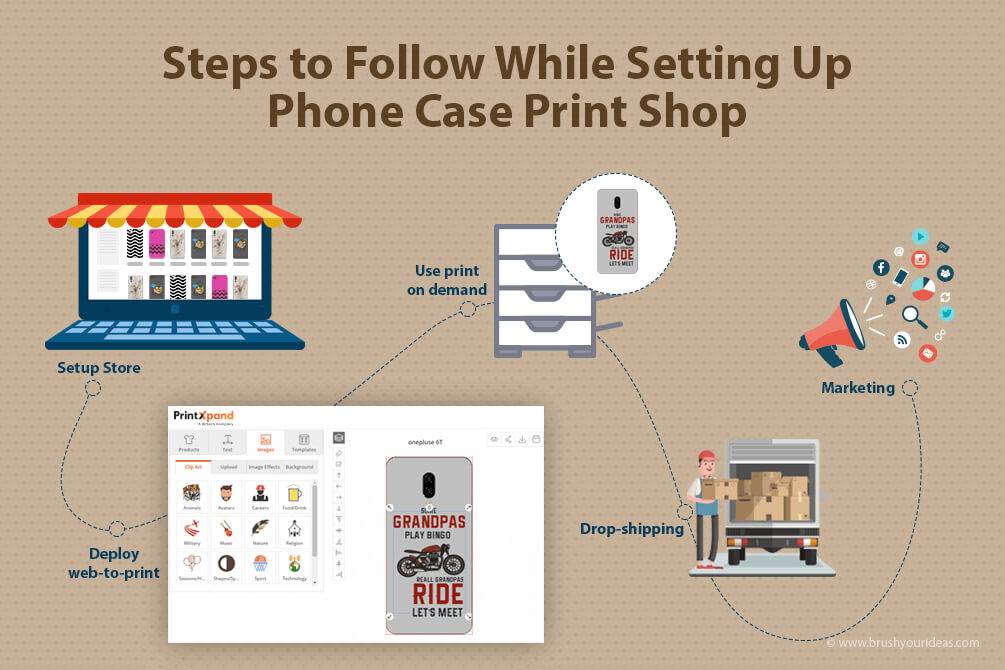It’s an endless debate. Especially when you’re starting one. But deep in the crevices of our hearts, we all know it. Start-ups are cool.
They have flexibility and flair that traditional businesses cannot offer. Consider, for example, a traditional print shop and a niche web-to-print start-up.
The traditional model:
– Makes it necessary to have expensive equipment
– Mandates physical outlets
– Needs a workforce to run them
On the other hand, a start-up:
– Uses the latest supply chain, models
– Leverages e-commerce
– Facilitates remote work
This goes to show that a start-up is a way of doing business that aligns with the principles and habit patterns of modern society. It is not just a promise sought after by 20-somethings. It is quite a serious undertaking.
While the traditional business model may have its own merits, it is not accessible to everyone. On the other hand, you can start a phone case print shop on a shoestring budget, while keeping your day job and with the knowledge and assets available to you.
Entrepreneurs around the world have proved this model time and time again. But we are fundamentally biased people. There are plenty of reasonable arguments that one can make to avoid the idea. Tim Ferriss, in his book, “the four-hour work-week”, says “People will choose unhappiness over uncertainty.”
So, if you want to get over it and start a phone case printing business, quit making excuses and jump in. Here are all the things that you need to consider.
1. The Product
“Where do I get the designs?”
“How do I know if they’ll get popular?”
There are countless such questions plaguing the online print store founder. The answer? You don’t have to know these things.
Simply use a mobile skin design software to let your customers create their own designs. This “web-to-print” store will attract customers by giving them the freedom to create the designs that they desire. They can upload and customize anything from a simple pattern to a picture of their favorite character.
The phone case printing software is a great tool that eliminates many dilemmas and inhibitions that an entrepreneur might have to start a web-to-print store.
- Types of Phone Cases
You can spread phone cases over a vast spectrum, ranging from cool to practical. But you cannot possibly have all these surfaces available for printing. Refer the below list and choose the ones that will best suit your client’s needs.
– Slim Cases
Slim cases are cheap, popular, and largely overrated. Still, your customer is most likely to buy one of these. They use a silicon gel to add grip and design. Additionally, you can use them for print-on-demand.
– Bumper Cases
Bumper cases keep going in and out of fashion. They are essentially sides/borders that you can put around your phones. The material used is often harder and shock-resistant. For those of your customers who prefer minimal designs and products, this is the case of choice.
– Wallet Cases
These cases have a flap that folds over the screen to protect the screen from scratches, giving it the appearance of a small notebook. You can even stick some cash or cards or maybe a parking ticket inside.
– Tough Cases
For those of your customers who’re clumsy or even simply over-cautious, you can offer tough cases, which are tougher than most cases, and undergo drop tests and water resistance tests. These can work on landline phone services and other large phones that businesses use.
Once that you have finalized the designs, it naturally follows that we need a printing solution. In 2023, that solution is print on demand.
Print on demand uses digital printing to provide one of the items in small batches as and when required. You can hire a printing shop for this if you don’t want to invest in machinery at a nascent stage.
It also reduces the risk in buying inventory. So, you don’t have to worry whether your designs will sell or not. Just decide on the printing methods and negotiate the price. Sure, this might increase the cost per piece but it negates the overall risk.
2. The Store
You might’ve guessed, we’re not talking about bricks and mortar here.
Your website is your store. A major chunk of your investment is going to go into your web store. Whether it’s an e-commerce platform or an integrated solution, you must give it due consideration before purchasing it.
For example, it may sound obvious that you must consider the costs, but there are a lot of different hidden costs that you might overlook. This could cost you more than your estimates. A platform may depend on third-party apps for certain functions, adding to what it costs you.
Next, you are going to need a mobile phone case design software. This may come integrated with your store-front or, in case you decide to go for a separate e-commerce solution, may be available for purchase.
Make sure you get all the best features that you’re going to need. A neat packaging will be an added advantage. If you’re not that tech savvy and do not wish to invest your time and money in a developer, it is highly recommended that you try out a web-to-print storefront solution.
Fair warning though, your work is far from done. The feature rich platforms may make it seem easy to establish an online business. It is quite challenging to run an online store.
Additionally, if you’re shipping your phone cases across the globe, you need to make sure that your store-front supports multiple languages.
3. The Method
“But what about other risks?”
If you’re starting a company, you should be prepared for failure, irrespective of your methodologies. There are many reasons for that. But you can trace most of them back to the b-plan. All plans are perfect in theory. That’s their point. But whether they will work in the real world or not is a different question.
Out of the disparity in theoretical models and the real world, emerged the methodology called ‘The Lean Start-up’. The lean method works through iterations of “build-measure-learn”.
Essentially, it involves building the minimum marketable version of the product and releasing it to the real world. After that, we record quantifiable results and undergo validated learning. We do this iteratively till we reach what is known as a product-market fit.
This way, it is easier and faster to build a product that people love, without as much cash-burn. We can use a similar process to validate our questions and beliefs about the venture.
The advantage here is that our decisions are based on empirical knowledge as opposed to theories. This process is going to last throughout the website lifecycle. This will help us in determining which approach works and which doesn’t and taking the right decision.
Another approach that you may experiment with is ‘remote’ work. According to Basecamp, the pioneers of remote work, “remote shows both employers and employees how they can work together, remotely, from any desk, in any place, anytime, anywhere.” The central idea behind this approach is that companies can find employees who are best suited irrespective of the geographical constraints, and vice-versa.
Other than that, it has benefits such as exemption from operational costs like rent and cost-cutting on a commute.
4. The Supply-Chain
One word: Drop-shipping.
Drop shipping is the supply chain model where the business owner doesn’t own the inventory. Instead, he uses his e-commerce store to get sales orders which he directly forwards to the supplier/manager for a cut.
It is the preferred form of supply-chain management due to its transparency and traceability. Manufacturers who participate in drop-shipping are 18.33% more profitable than manufacturers who rely on conventional channels since they’re not as dependent on the inventory space of retailers.
This is an all-around win-win situation. The customer is happy because of the shorter delivery time. The supplier gets better margins. And you as a merchant
- Don’t have to manage or pay for a warehouse
- Don’t have to bear the hassle of packaging and shipping the orders
- Don’t have to track the inventory for accounting
- Don’t have to handle returns
- Don’t have to maintain the inventory
5. Marketing
The critical factor and practically the only thing you are responsible for as the drop-shipping business owner is marketing. Maintaining accurate organic results is important in the initial stages.
The cash-burn is low. You can adopt organic marketing practices such as SEO, or inbound marketing in general, without burning a hole in your pocket. You can experiment with different marketing channels with minimal risk.
The most important numbers that you have to keep a close eye on is of the organic traffic because organic growth is a good metric to validate your business model.
This knowledge will come in handy when you get to market your business actively.
If you don’t want to get into detail, there is a simple metric you can use to see where you’re heading with your marketing efforts. Calculate the Customer acquisition cost.
But to this day, the best kind of marketing is the word of mouth between the satisfied customer and the people in his circle. This has become even more relevant in the internet age, where reviews are public.
Beyond that, you must promote your product digitally. You can do this in a passive monthly budget or in short sprints whenever there’s a festive season or when a promising design comes out.
6. What Next?
The logical next step for you would be either to scale or to diversify. There is no limit. Your business will grow into the boundaries of your vision. Let us summarize the first phase of activities in a step-by-step roadmap before we briefly discuss the immediate next step.
-
- Web store
Ideally, if you are going to invest in a web store for a digital printing business, it is advisable to go all in and invest in a full functioning e-commerce web-to-print web store. A web store that can showcase multiple products with a proper payment gateway. Moreover, an e-commerce web store is easily scalable as you can turn a phone case printing business into a full-fledged online printing business with products like mugs, t-shirts, shoes, etc.
After you have deployed a well-thought e-commerce web store keeping in the user experience in mind, the next step would be to look for compatible web-to-print software.
- Web store
- Deploy web-to-print
As mentioned above, the next obvious step is to equip your web storefront with compatible web-to-print software. Now, this might be the step where you might feel overwhelmed with all the choices and options available. And with so many choices, comes the fear of doubt. What if you chose the wrong option?
Well, you can’t do wrong if you keep the website platform in mind while making this selection. Just make sure that the product designer tool (web-to-print tool) you choose integrates with the e-commerce platform.
But with these two steps, you have only set up the front-end of your business. The next two steps are the crucial ones where you will be setting up the backend process which will, in the long run, affect the customer experience and quality of your service.
- Use print on demand
If you have read till here, then I would assume that you want to go with the start-up option where there will be very less cash to invest. And printing machines and buying inventory isn’t exactly cheap. And the space to accommodate and operate these machines will go against the startup nature of your business.
So, in such cases, print on demand is the best and viable option for you. Test the market by distributing some samples around the market. Take decisions based on the data you receive rather than going blindly with what you feel is right. Make it customer-centric and it will sure be a success.
Up until here, we have sorted you with almost everything. Now, you just have to make a quick decision on the shipping method.
- Drop-shipping
If you are setting up an online business, you might as well target the customers globally. It’s like If you dreaming, you might as well dream big.
So, to make your web store compatible with the global market, you would want to go with the drop-shipping method.
A method where you are trading a small bit of your profit with the supply-chain management company and they will be taking overall care of all your shipping.
Sounds good, right?
Because it is.
Being a startup, you won’t be able to do everything in-house and outsourcing these hectic things will make you concentrate on more important things like marketing which is the last stop on our concluding points.
- Marketing
The word marketing itself sounds fancy. Doesn’t it?
And it surely is.
But not for the start-ups. There is some easy and inexpensive way to market your products in this information crazy world. Some best marketing practices recommended for startups are SEO, inbound marketing, organic marketing, social media marketing, etc.
Don’t get overwhelmed. Just pick one method of marketing keeping in mind where you targeted audience spends its most time and move ahead from there.
Conclusion:
Any market with a low barrier to entry will attract multitudes of vendors. But there’s no point trying to out-muscle the competition. In that situation, no one wins. You must always aim for a product-market fit. Marc Andreessen defines the term as “being in a good market, with a product that can satisfy that market.”
Most people aren’t born geniuses. Genius occurs in flashes. What you must do to come out triumphant, is to keep at it, diligently, and the sparks come. Unfortunately, no one can tell you what coming up with a product-market fit feels like. You can only experience it. And the more you have experienced, the better chances you have of finding it again.
All product and company names are trademarks™ or registered® trademarks of their respective holders. The use of them does not imply any affiliation with or endorsement by them.




